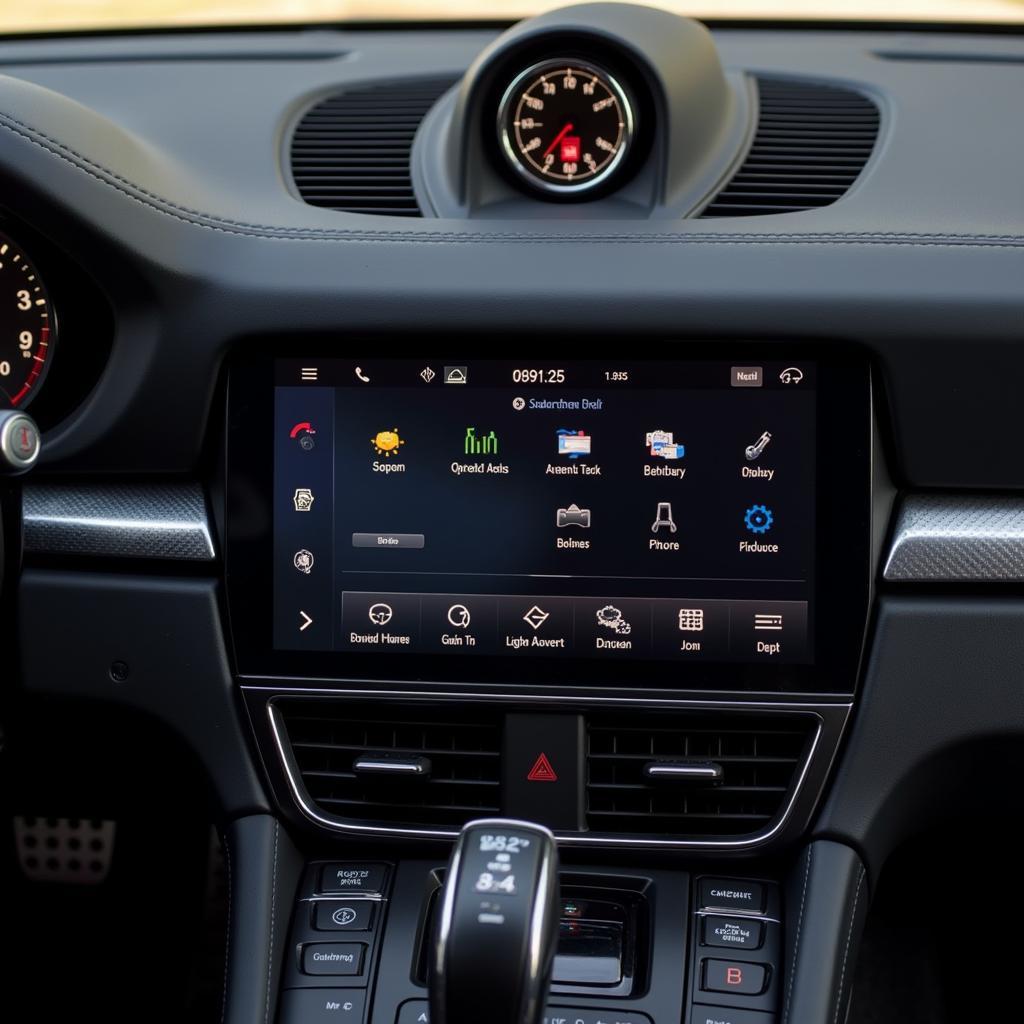Porsche vehicles are renowned for their luxury, performance, and cutting-edge technology. A key aspect of this technology is the integration of Bluetooth systems, which enhance the driving experience by enabling hands-free calling, audio streaming, and vehicle diagnostics. However, like any complex system, Porsche Bluetooth can encounter issues, requiring diagnostic procedures to identify and resolve them. This comprehensive guide delves into the world of Porsche Bluetooth diagnostics, providing valuable insights for both car owners and technicians.
Understanding Porsche Bluetooth Systems
Before diving into diagnostics, it’s crucial to understand the fundamentals of Porsche Bluetooth systems. These systems utilize short-range wireless technology to establish communication between your Porsche vehicle and compatible devices, primarily your smartphone. This connection facilitates various functions, including hands-free calling, audio streaming via platforms like Apple CarPlay and Android Auto, and in some models, accessing vehicle data through dedicated apps.
Common Porsche Bluetooth Problems
While generally reliable, Porsche Bluetooth systems can experience a range of issues, including:
- Pairing Problems: Difficulty connecting your smartphone or other Bluetooth devices to the car’s system.
- Dropping Connections: Intermittent or complete loss of Bluetooth connection during use.
- Poor Call Quality: Static, echo, or muffled sound during calls.
- Audio Streaming Issues: Interruptions, poor sound quality, or lack of control over music playback.
- Diagnostic Trouble Codes (DTCs): Specific error codes stored in the vehicle’s computer indicating Bluetooth system malfunctions.
Porsche Bluetooth Diagnostic Procedures
Diagnosing Porsche Bluetooth issues requires a systematic approach:
-
Check the Basics: Before delving into complex procedures, ensure Bluetooth is enabled on both your Porsche and your device. Verify that your device is compatible with your Porsche’s system and that it’s within range.
-
Restart Your Devices: Often, a simple restart of your Porsche and your smartphone can resolve minor connectivity glitches. Turn off both devices, wait a few minutes, and then turn them back on.
-
Consult Your Owner’s Manual: Your Porsche owner’s manual is a valuable resource for troubleshooting Bluetooth problems. It provides model-specific instructions, pairing procedures, and information on resetting the system.
-
Check for Software Updates: Outdated software can lead to compatibility issues. Ensure both your Porsche’s infotainment system and your smartphone have the latest software versions installed.
-
Professional Porsche Bluetooth Diagnostic Tools: For more complex issues or if basic troubleshooting steps fail, professional-grade diagnostic tools are essential. These tools allow technicians to:
- Read and Interpret DTCs: Retrieve and decipher error codes stored in the vehicle’s system, pinpointing the source of the problem.
- Access Live Data Streams: Monitor real-time data from various sensors and modules within the Bluetooth system to identify anomalies.
- Perform Module Programming: Update or reprogram the Bluetooth module’s software to address compatibility issues or software glitches.
Remote Diagnostics and Software Solutions
In today’s technologically advanced automotive landscape, remote diagnostics and software-based solutions are increasingly prevalent. Cardiagtech specializes in providing these cutting-edge services, offering Porsche owners and technicians a convenient and effective way to diagnose and resolve Bluetooth issues.
“Remote diagnostics have revolutionized the way we approach vehicle repairs. We can now diagnose and even fix many Porsche Bluetooth problems remotely, saving our clients time and money,” says Mark Wilson, Senior Automotive Engineer at Cardiagtech.
Our remote services include:
- Remote Scanning and Diagnostics: Our team can remotely connect to your Porsche’s onboard computer system to read and analyze DTCs, providing you with a comprehensive diagnosis.
- Software Updates and Programming: We can remotely install the latest software updates for your Porsche’s Bluetooth and infotainment systems, ensuring optimal performance and compatibility.
- Expert Technical Support: Our experienced technicians are available to provide remote guidance and support throughout the diagnostic and repair process.
Contact Cardiagtech for Expert Porsche Bluetooth Diagnostics
Experiencing persistent Bluetooth problems with your Porsche? Don’t let these issues detract from your driving experience. Contact Cardiagtech today at +1 (641) 206-8880 or email us at [email protected]. Our team of expert technicians, specializing in Porsche vehicles, is equipped with the latest diagnostic tools and software solutions to diagnose and resolve your Bluetooth issues accurately and efficiently. Visit our workshop conveniently located at 276 Reock St, City of Orange, NJ 07050, United States.
FAQs
1. Can I use any Bluetooth device with my Porsche?
Porsche vehicles are designed to be compatible with a wide range of Bluetooth devices, but it’s essential to consult your owner’s manual or Porsche’s website for model-specific compatibility information.
2. Why is my Porsche Bluetooth not connecting to my phone?
Several factors could be at play, such as Bluetooth being disabled on either device, pairing issues, or distance limitations. Refer to the troubleshooting steps mentioned earlier in this guide.
3. How do I update the software on my Porsche’s infotainment system?
You can usually find instructions on how to check for and install software updates in your owner’s manual. Alternatively, you can contact your local Porsche dealership or a specialized service center like Cardiagtech.
4. What is involved in Porsche Bluetooth module programming?
Module programming involves updating or reinstalling the software that controls your Porsche’s Bluetooth system. This is often done to address compatibility issues or software glitches.
5. Can Cardiagtech help me with other Porsche electronic issues?
Absolutely! CARDIAGTECH specializes in a wide range of Porsche electronic diagnostics and repairs, including issues with engine control units, transmission control modules, and other electronic systems.

